Kull is program director of the Program for Public Consultation. Lewitus is a research analyst at Voice of the People.
As immigration figures prominently in campaigns across the country, a new survey by the Program for Public Consultation in six swing states and nationally finds numerous policies on which majorities of Americans agree, including, in most cases, majorities of both Republicans and Democrats.
With millions of undocumented immigrants living in the United States, a majority in every swing state and nationally prefer offering them a path to citizenship — provided they meet several requirements — over mass deportation.
To deter illegal border crossings, swing state and national majorities favor strengthening the border and making it harder for illegal immigrants to get employment by requiring that employers use the E-Verify system. At the same time, majorities favor increasing the number of work visas to meet the demand for workers through legal channels.
Majorities favor reforms that would reduce the number of undocumented immigrants, not via mass deportation, but by creating more legal pathways for people who want to live and work here, and by strengthening the border to make it more difficult for people to enter the country illegally.
This is the ninth Swing Six Issue Survey being conducted in the run-up to the November election in the swing states of Arizona, Georgia, Michigan, Nevada, Pennsylvania and Wisconsin, as well as nationally, on major policy issues. Unlike traditional polls, respondents in a public consultation survey go through an online “policymaking simulation” in which they are provided briefings and arguments for and against each policy. Content is reviewed by experts on different sides to ensure accuracy and balance. All Americans are invited to go through the same policymaking simulation as the survey sample.
Path to citizenship vs. mass deportation
Respondents were told that there are about 11 million people who have been living in the U.S. without legal status, most for over a decade. They evaluated two significantly different proposals for dealing with this population — a path to citizenship and mass deportation — including strong arguments for and against each. Finally, they were asked to choose one of the proposals or neither.
Majorities in every swing state prefer the path to citizenship (ranging from 55 percent to 65 percent), which was summarized as follows:
Create a new type of visa that would be available to undocumented immigrants who have been living in the US for some years and have not committed a serious crime. They would pay a penalty, and any taxes they owe. After several years, they would be allowed to apply for citizenship. Those who do not apply or qualify for the visa would be subject to deportation.
Just 24 percent 30 percent in the swing states prefer mass deportation, which was summarized as follows:
Undertake a program of mass deportation throughout the country, with the goal of finding, detaining and deporting most or all of the 11 million people who have been living in the US without legal status. States would be asked to use their local law enforcement or National Guard, and the Federal government may use the military. Large facilities would be built to hold people who have been detained. The cost would be $100 billion or more.
Among Republicans, in five of the six swing states, a path to citizenship is preferred over mass deportation. Modest majorities prefer a path to citizenship in Arizona, Nevada and Wisconsin (51 percent to 55 percent). In Michigan, 50 percent prefer a path to citizenship (38 percent for mass deportation). In Georgia, it is 47 percent to 40 percent. Republicans In Pennsylvania are evenly divided (42 percent for each option).
Among Democrats, majorities in all states prefer a path to citizenship, ranging from 67 percent in Georgia to 77 percent in Michigan, Nevada and Wisconsin. It is favored by 70 percent in Arizona and 71 in Pennsylvania.
Nationally, 58 percent prefer a path to citizenship and 26 percent mass deportation. More Republicans prefer a path to citizenship (45 percent) than prefer mass deportation (40 percent). Among Democrats, 75 percent prefer a path to citizenship.
Neither option is chosen by 9 percent to 15 percent in the swing states, including 7 percent to 14 percent of Republicans and 9 percent to 11 percent of Democrats. Nationally, 15 percent do not want either option.
Among every demographic group — including by race, ethnicity, gender, age, income and education — a majority prefers a path to citizenship, in the swing states as a whole and nationally.
Strengthening the border
A legislative proposal to increase the number of Border Patrol agents from about 20,000 to 22,000, and to provide more funding for surveillance, is favored by bipartisan majorities in the swing states (71 percent 77 percent), including 77 percent to 82 percent of Republicans and 65 percent to 79 percent of Democrats. Nationally, a bipartisan majority of 70 percent are in favor (Republicans 74 percent, Democrats 71 percent).
Building more walls along the southern border by replacing existing fencing with walls and building walls where no barriers currently exist, which is estimated to cost around $25 billion, is favored by majorities in every swing state (57 percent to 64 percent), but it is not bipartisan.
Majorities of Republicans (76 percent to 83 percent) are in favor in all states. But among Democrats, majorities are opposed in Arizona, Michigan, Pennsylvania and Wisconsin (53 percent to 57 percent). Views are divided in Nevada (48 percent in favor, 51 percent opposed), while a majority are in favor in Georgia (56 percent).
Nationally, a modest majority of 55 percent are in favor, including 72 percent of Republicans, while 57 percent of Democrats are opposed.
Deterring illegal entry while increasing work visas
Americans show support for steps that would deter illegal border crossings by making it more difficult for undocumented immigrants to get employment while also increasing the availability of work visas.
One proposal is to require employers to verify that all new hires are legally allowed to work in the U.S. by using the E-Verify system. This proposal is favored by bipartisan majorities in the swing states (67 percent to 73 percent), including 66 percent to 77 percent of Republicans and 71 percent to 78 percent of Democrats. Nationally, a bipartisan majority of 68 percent are in favor (Republicans 64 percent, Democrats 74 percent).
Respondents also evaluated a proposal to increase the number of migrant workers who enter the U.S. legally by increasing the number of work visas available, provided there is a demand for such workers. Respondents were informed that: work visas are only granted if the employer has tried and failed to fill the position with an American worker; that employers must pay migrant workers the same wages they would to American workers; and that currently offering more visas would substantially increase the number of legal migrant workers.
This proposal was supported by majorities in the swing states (65 percent to 71 percent), including majorities of Democrats (79 percent to 84 percent). Among Republicans, majorities are in favor in Arizona, Georgia, Nevada and Wisconsin (58 percent to 64 percent), and half are in support in Michigan and Pennsylvania (51 percent in each). Nationally, 67 percent are in favor, including 84 percent of Democrats and a modest majority of Republicans (53 percent).
Support is higher when requiring E-Verify and more work visas are combined as a package. Respondents who favored only one proposal were asked whether they would support both proposals as a package.
When combining those who favored both proposals on their own with those who favored both proposals only as a package, support rises to 72 percent to 79 percent, including 63 percent to 78 percent of Republicans and 81 percent to 86 percent of Democrats. Nationally, support rises to a bipartisan majority of 74 percent (Republicans 67 percent, Democrats 85 percent).
This follow-on question was asked because support for one of the above proposals may depend on whether the other is passed into law. For example, a person may only want to increase the number of work visas if it will also be harder for employers to hire undocumented workers.
Hiring more judges for asylum cases
Respondents were informed that there is a record-high backlog of asylum cases and that, as a result, asylum seekers are now waiting in the U.S. for an average of four years before their cases are heard.
A proposal to hire several hundred more immigration judges, in order to speed up the processing of asylum cases, is favored by majorities in the swing states (58 percent to 68 percent), including majorities of Democrats (73 percent 77 percent). Views are mixed among Republicans: Majorities are in favor in Arizona, Georgia and Nevada (57 percent to 63 percent), views are divided in Michigan, while majorities are opposed in Pennsylvania and Wisconsin (54 percent in each).
Nationally, 58 percent are in favor, including a majority of Democrats (74 percent), while a majority of Republicans are opposed (54 percent).






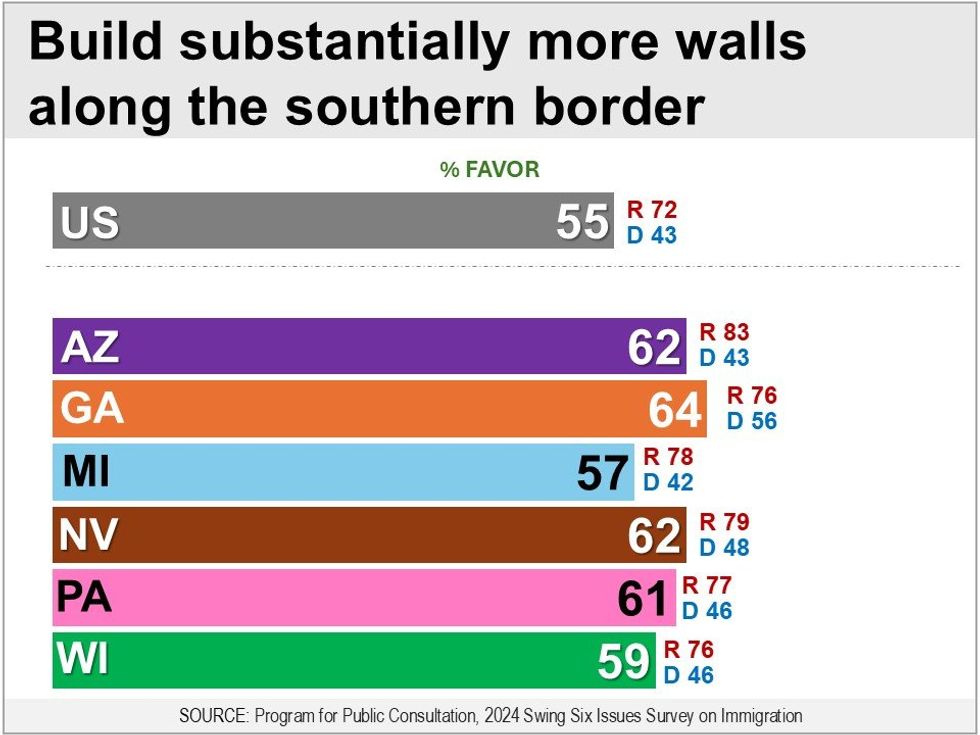
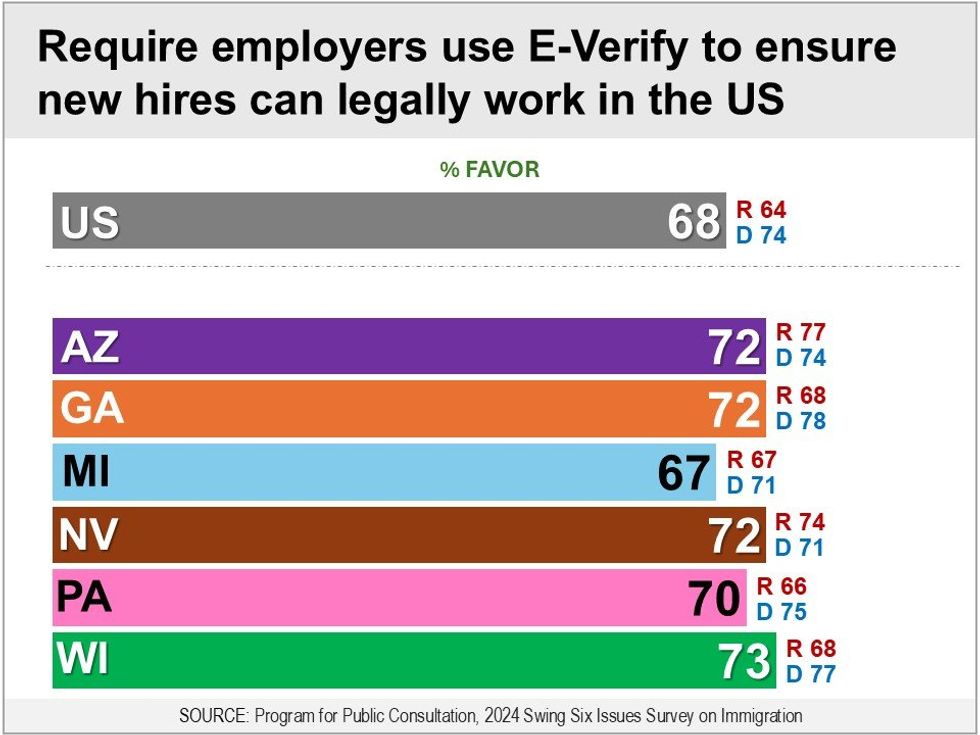
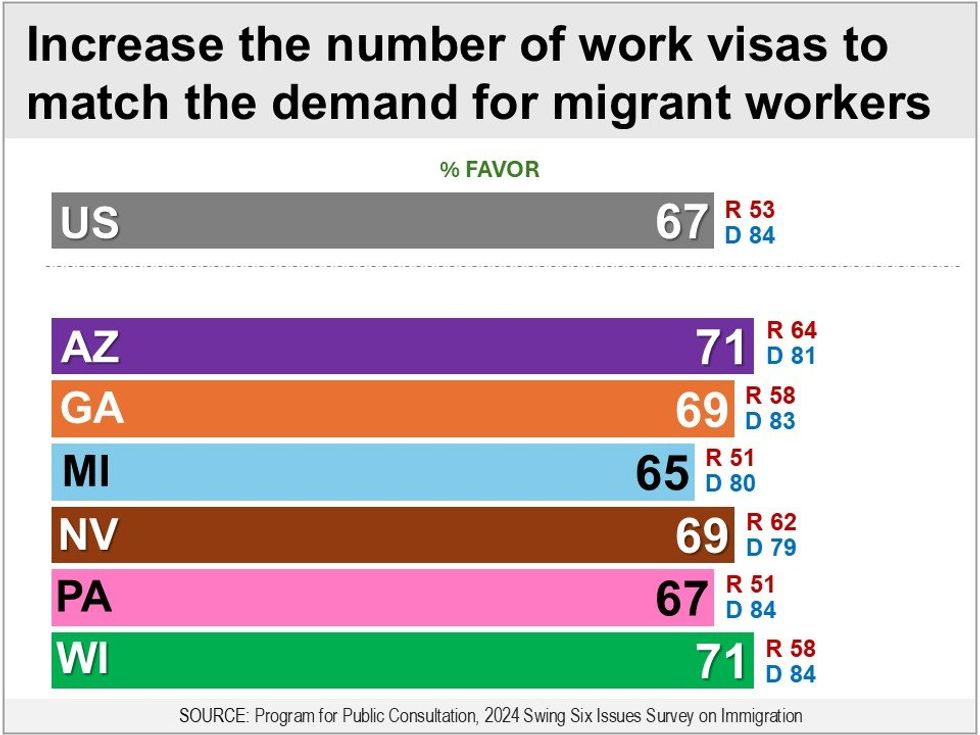
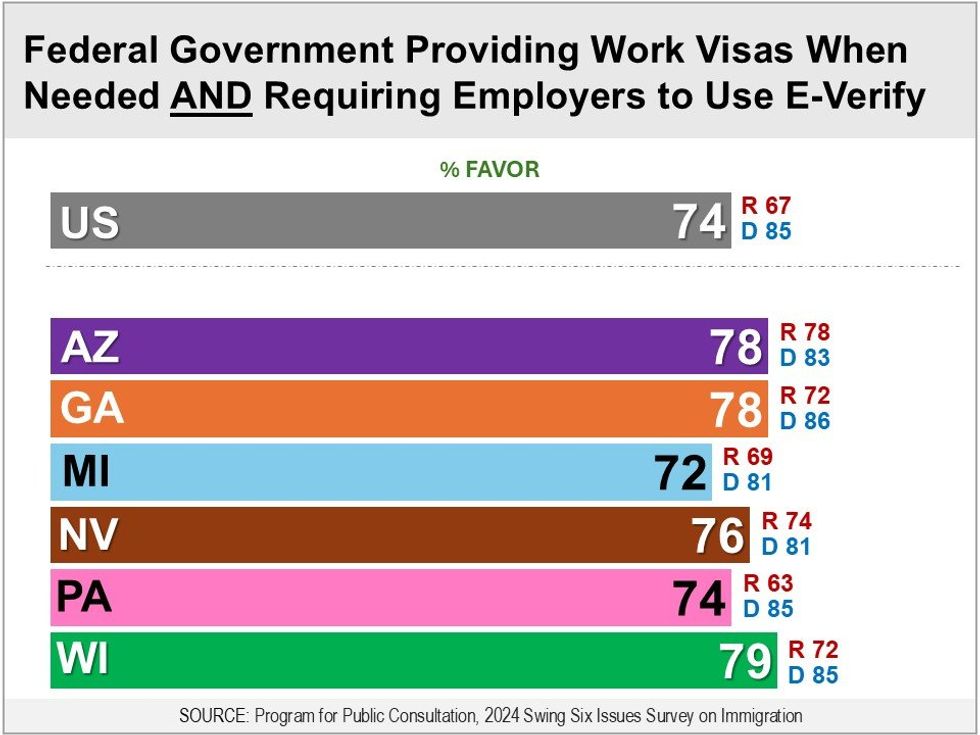



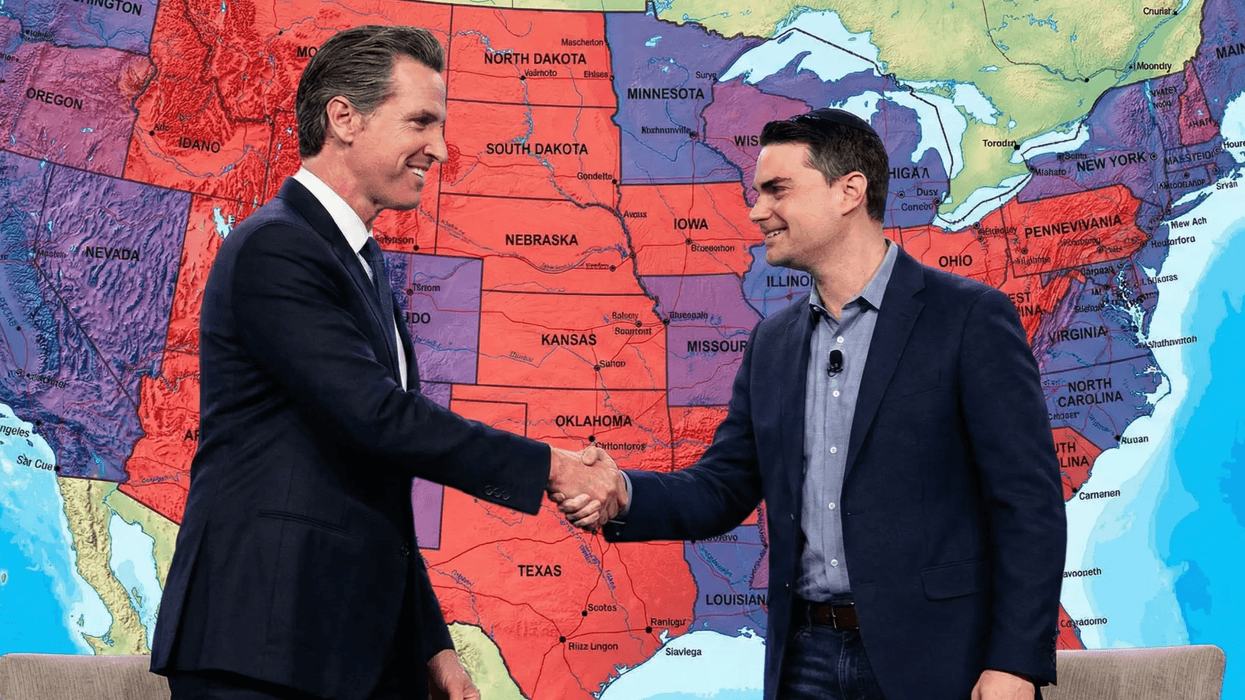






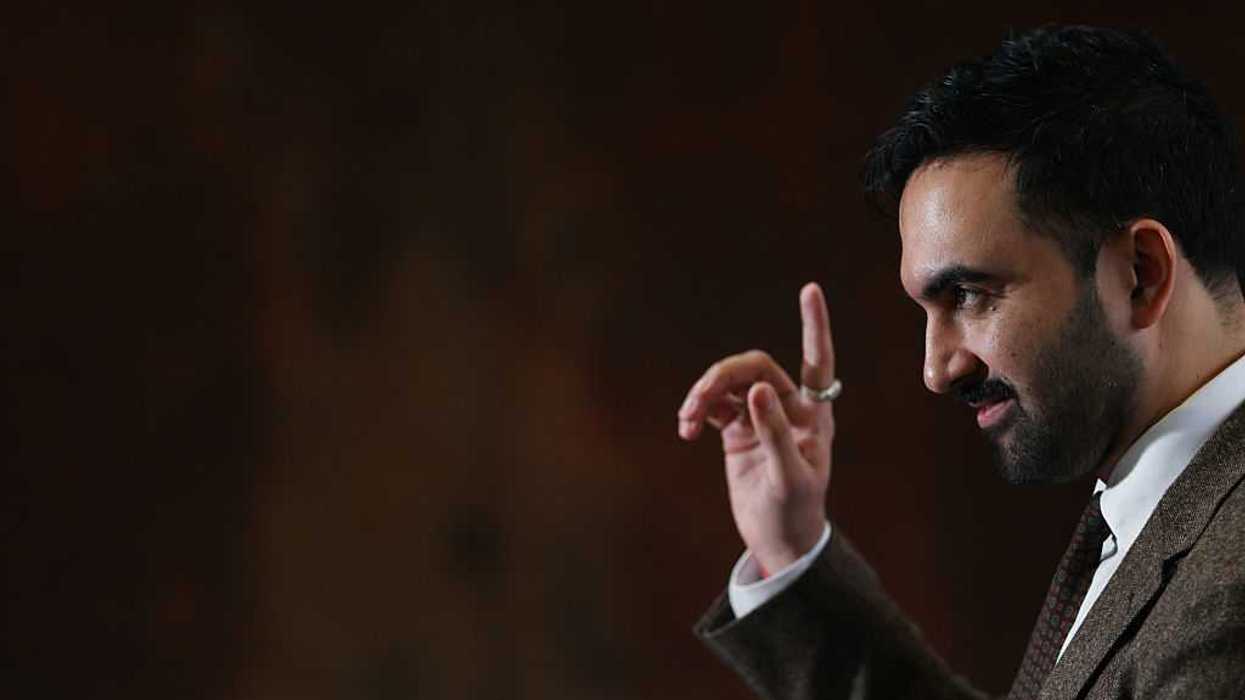

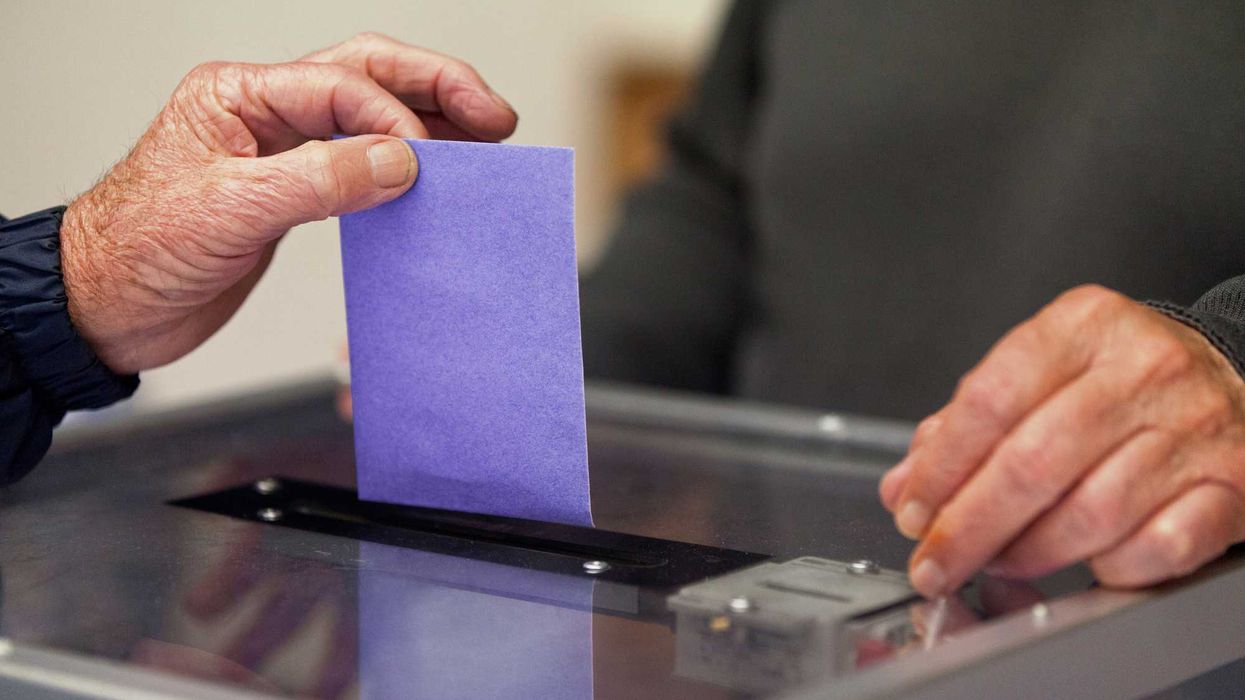
Trump & Hegseth gave Mark Kelly a huge 2028 gift